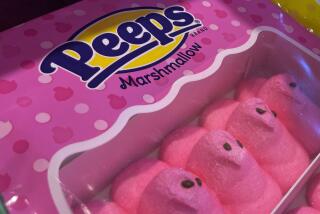What Warrants Organic Label? It’s a Nettlesome Issue : Agriculture: USDA volunteers are setting up standards sought in a 1990 law. But figuring out what is ‘natural’ or ‘artificial’ can be vexing.
- Share via
WASHINGTON — May environmentally conscious dairies add Vitamin A and D to milk, as required by law, and still call it organic? Is there a “natural” sulfite to enhance the flavor of wine made with organically grown grapes?
Issues like those have been vexing a panel of volunteers helping the U.S. Department of Agriculture create nationwide standards for organic foods.
The 14-member National Organic Standards Board, composed of environmentalists, farmers, processors, a retailer, a scientist, and consumer advocates, has fallen behind schedule. Federal standards were supposed to be in place Oct. 1, according to the 1990 law that created the board.
But members weren’t appointed until January, 1992, and neither Congress nor the department provided much money for meetings. This year there are more funds, including money for departmental staff to help draft proposed regulations for Agriculture Secretary Mike Espy to review in May.
Espy will have the final word on how to balance the requirement to promote organic foods with the worry that organic labeling will cause conventional products to be viewed as less safe.
Standards are scheduled to become final in 1995.
“We’re still discussing the way it might be labeled . . . whether it will just say ‘done in accordance with federal law,’ or whether there will be a USDA seal that will go on the product,” said Harold Ricker, who runs the National Organic Production Program at the department.
The conventional food industry has little to worry about so far. Retail sales of organically produced foods exceed $1 billion a year, but that is less than 1% of overall food sales. But the volume could triple by 1995, the department says, citing private research.
“We would love to sell as much organic as we can, but we can’t always get everything organic,” said Kathy Ordan, marketing director at Fresh Fields Markets Inc., a Rockville, Md., based chain of health food supermarkets.
Worries about fraud and inconsistent standards among certifying groups, and heightened concern about farm chemicals after the 1989 uproar over Alar’s use on apples, led to the call for federal standards.
When final, the standards will cover everything from how to certify farms as organic producers to how to label processed foods, such as breakfast cereals, if they contain some artificial ingredients.
The law says farms won’t be certified unless growers have stopped using pesticides and artificial fertilizers for three years. Farms will have to file “organic farming plans” and keep records concerning their methods.
The panel must determine what to do if a pesticide spray for a conventional field drifts onto an organic field, or if officials require an organic field to be sprayed because of an emergency.
Sulfites are banned under the law, but some winemakers want to allow “natural” sulfites produced by burning natural sulfur and blowing the gas through water. Baking powder has artificial ingredients. The ascorbic acid used to keep canned fruit from browning also is artificial. Vitamins A and D, required in milk, are synthetics.
“Are you going to say on the label, ‘Milk: With Organic Milk?’ ” asked Katherine DiMatteo, executive director of the Organic Foods Production Assn. of North America.
More to Read
Eat your way across L.A.
Get our weekly Tasting Notes newsletter for reviews, news and more.
You may occasionally receive promotional content from the Los Angeles Times.











